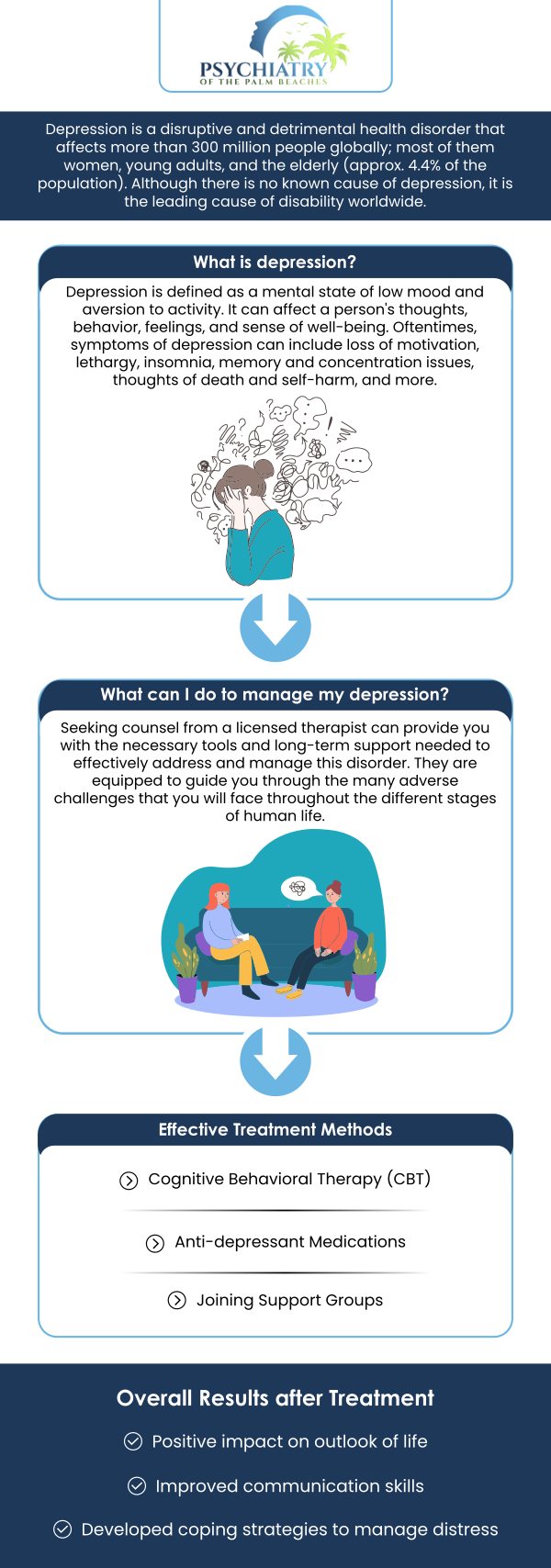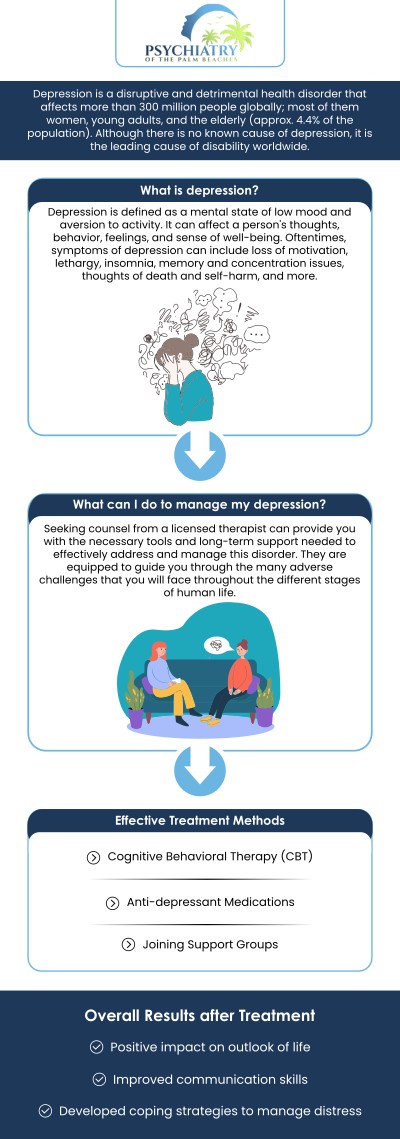Depression Treatment Specialist in Royal Palm Beach, FL
At Psychiatry of the Palm Beaches in Royal Palm Beach, FL, we offer personalized depression treatment plans tailored to your unique needs. Our experienced psychiatrists and therapists utilize evidence-based approaches to help you manage your symptoms, improve your mood, and regain control of your life. For more information, contact us or schedule an appointment online. We are conveniently located at 420 South State Road 7 Suite 112 Royal Palm Beach, FL 33414.


Table of Contents:
Can exercise have a therapeutic effect on depression?
How does depression impact one’s work performance and career?
What are the latest advancements in medication for depression?
At Psychiatry of the Palm Beaches, we understand that depression is a complicated disorder that necessitates a comprehensive approach to therapy. While our expert psychiatrists and therapists offer standard treatment options such as medication and psychotherapy, we also understand the therapeutic benefits of exercise for depression.
Physiological Effects
Exercise promotes happiness by releasing endorphins, which bind to brain opioid receptors. It decreases stress hormones such as cortisol, which are linked to depression. Exercise also improves brain development, learning, memory, and mood management. It also improves sleep duration and quality, which are important for mood management.
Psychological Effects
Exercise can also serve as a distraction from negative thoughts, shift focus, and break the cycle of negativity. It can boost self-efficacy and self-esteem while improving coping abilities and resilience by reducing stress. Group exercise programs, which we can advise on, provide opportunities for social interaction and support, further contributing to mood enhancement.
Recommendations
The team of specialists at Psychiatry of the Palm Beaches suggests doing moderate-intensity exercise for at least 30 minutes most days of the week. Beneficial activities can include brisk walking, running, swimming, and resistance training. While exercise can help alleviate symptoms of depression, it should not replace professional treatment.
Depression leads to cognitive impairments, including difficulties in focusing, decision-making problems, and a decreased ability to solve problems. The resulting mental fog can make it challenging to prioritize work responsibilities, and decreased productivity can lead to increased errors and decreased efficiency.
Emotionally, depression often manifests as persistent feelings of sadness, hopelessness, and worthlessness, all of which can deplete motivation and enthusiasm. These negative emotions can make previously easy tasks challenging, lead to increased irritability, reduce the ability to cope with stress, and potentially disrupt workplace relationships.
Depression also presents physical symptoms such as fatigue, sleep disturbances, and changes in appetite. Fatigue can reduce energy levels, leading to decreased productivity and increased absenteeism. Sleep deprivation can further impair cognitive function, while changes in appetite can affect overall well-being and concentration.
Depression often results in social withdrawal, making it difficult for individuals to maintain connections with colleagues or participate in team projects. The isolation can exacerbate feelings of loneliness and hopelessness, creating a vicious cycle that further undermines work performance and strains interpersonal relationships.
If left untreated, depression can have severe career implications. Long-term absences can limit opportunities for advancement and jeopardize job security. Diminished performance can lead to negative performance reviews, demotions, or even termination.
We continuously strive to stay at the forefront of the latest advancements in depression treatment, to offer our patients the most effective and efficient options. We believe that novel medications that offer improved efficacy, tolerability, and reduced side effects can significantly enhance the lives of those suffering from depression.
Novel Antidepressants
Our first-line treatment for mild to moderate depression typically involves medications that help regulate neurotransmitters linked to mood.
Transcranial Magnetic Stimulation (TMS)
Our facility also offers Transcranial Magnetic Stimulation (TMS), a non-invasive brain stimulation therapy for medication-resistant depression. TMS works by sending magnetic pulses to specific parts of the brain, modulating neuronal activity and improving mood.
Behavioral Therapy
At Psychiatry of the Palm Beaches, our professional therapists offer individualized behavioral treatment to assist people in overcoming depression. We provide appropriate coping methods and address the underlying causes of depression, enabling our patients to live better and happier lives.
Our Team Offers Holistic Approaches to Treating Depression
Depression affects both mind and body, and our team addresses this connection at Psychiatry of the Palm Beaches. His holistic treatment plans may include therapy, medication, lifestyle adjustments, and supportive interventions designed to improve overall well-being.
We are committed to applying the latest advancements in medication for depression, from novel drug therapies to non-invasive brain stimulation and behavioral therapy. Our focus is on providing optimal treatment modalities to improve patient outcomes and enhance the lives of those suffering from depression. We look forward to further understanding and optimizing these novel treatment strategies through ongoing research and clinical advancements. For more information, contact us or schedule an appointment online. We are conveniently located at 420 South State Road 7 Suite 112 Royal Palm Beach, FL 33414. We serve patients from Royal Palm Beach FL, Golden Lake FL, Westlake FL, Loxahatchee FL, Atlantis FL, and surrounding areas.
Check Out Our 5 Star Reviews



Additional Services You May Need
▸ Mental Wellness
▸ Relationship Coaching
▸ Depression and Mood Disorders
▸ Women’s Health
▸ Panic Disorder
▸ Medications Management
▸ Men’s Health
▸ Individual Psychotherapy
▸ Bipolar
▸ ADHD
▸ Geriatric Mental Health
▸ Couple’s Counseling
▸ Obsessive Compulsive Disorder
▸ Social Phobia Treatment
▸ Eating Disorders
▸ Post Traumatic Stress Disorder
▸ Psychotic Disorders


